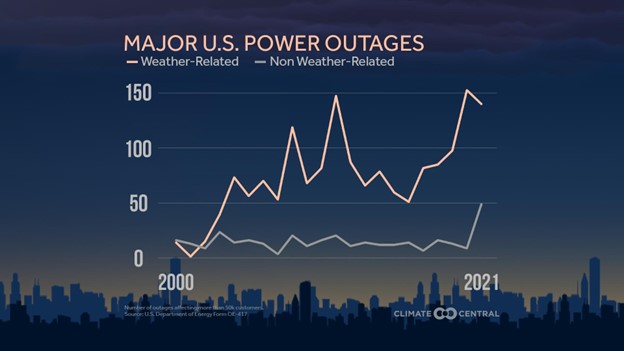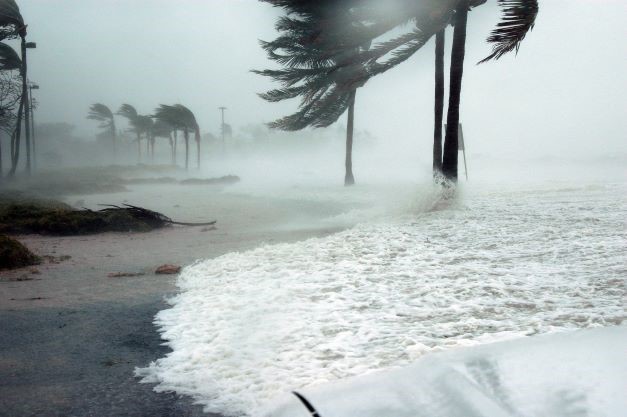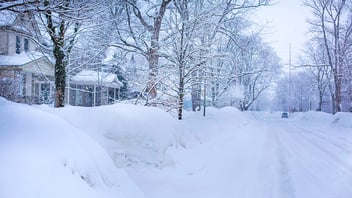Whether you buy into the idea of accelerated, man-caused climate change or not, our climate is always changing. It’s often hotly debated and politicized as to how much man has to do with the process, but we can all agree, weather-related power outages are becoming more common as the population grows, power grids age and fail, all while extreme weather events continue to wow us. Here’s the data to prove power issues are only getting worse.
Between 2000 and 2021, about 83% of reported major outages (events with 50,000 homes or more without power) in the U.S. were caused by weather-related events, according to Climate Central. Also, the average annual number of weather-related power outages increased by roughly 78% during 2011-2021, compared to 2000-2010.
From 2000-2021, there were 1,542 weather related power outages. Most were caused by winter weather (22%), tropical storms (15%) and other severe weather (58%). Most of the activity has been hampering the Southeast, Midwest and Northeast. As for individual states with the most outages, Texas, Michigan, California, North Carolina, and Pennsylvania. As for exact numbers of events effecting 50,000 or more homes, Texas (180), Michigan (132), California (129), North Carolina (97), and Pennsylvania (82)—all of which are ranked among the top 10 in populous states in the country.

What Have We Learned?
The Power Grid Is Vulnerable! We all depend on the electrical power grid to serve our homes and small businesses, but the system is not perfect and vulnerable to large-scale outages caused by natural events like hurricanes, ice storms, flooding, heat waves and of course human-caused fires and naturally occurring wildfires.
Let’s face it, like our roads and bridges, the infrastructure and power grid need to be constantly upgraded to deal with larger energy demand and more frequent and intensifying storms, according to Climate Central. Our nation’s aging electrical infrastructure is stressed!
Think of this way. A heat wave means more residents will be running their AC to keep cool, while a powerline fails in high winds, setting fire to a power supply station and surrounding hills, forest, communities—you have a perfect storm—more demand for power and a compromised power supply. The old, current power grid wasn’t designed to meet the demands of today’s larger populations as everybody charges their cell phones daily, more and more powered equipment like computers and TVs in every home, while millions are recharging electric cars… let alone the challenges of extreme weather!
What Can You Do?
Besides the obvious standard practices like conserving energy, you can also be proactive to avoid an outage at home. Investing in a whole home or portable generator that runs on diesel fuel, natural gas or propane means you’ll have power while your neighbors sit in the dark.
Generator Mart can help you with a perfectly matched generator for your home power needs. Generator Mart offers home options portable generators that will also work for camping applications when you need to power a few appliances or on the worksite to power tools. Generator Mart also offer larger standby units for the home that not only will power your entire home, but also add value and equity to one of your largest investments, your property.
Let’s talk about your power needs to avoid the next outage. If you are looking for a power options to keep the homestead running, contact Generator Mart at (877) 363-0349.

RELATED POSTS
Proin auctor nibh vitae urna lobortis, in vulputate erat facilisis. Sed lacinia lorem eget orci finibus, et maximus nisi sagittis.

Ann Arbor Power Outages Have Residents and Small Business Owners Fired Up
When I think of Ann Arbor, I think of Michigan Football, but lately the town has been making headlines for all the wrong reasons. With frequent power...
Read more »
Power Outages: Weather, Blackouts........... Now We Have To Worry About...
As if our electrical grids aren't facing enough challenges, extreme weather, rolling blackouts and record demand for power, all while the...
Read more »
CA, MI Take Brunt Of Late February Storms With Power Outages
Ice storms, flooding, mudslides, high winds…. It’s winter of course, but with aging power grids and increases in demand, power outages are once again...
Read more »
